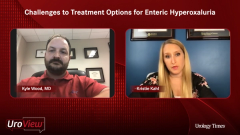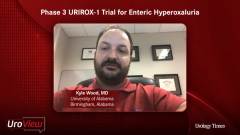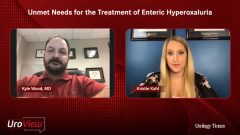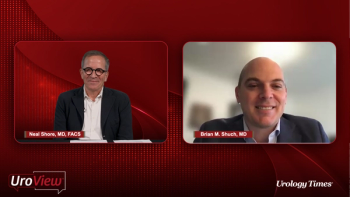
Phase 3 URIROX-1 Trial for Enteric Hyperoxaluria
Kyle Wood, MD, reviews data and clinical implications for the use of reloxaliase in enteric hyperoxaluria as seen in the phase 3 URIROX-1 trial and shares insight on additional ongoing trials.
Episodes in this series

Kristie Kahl: You mentioned 1 of the concerns is trying to address the underlying condition. What are some of the ongoing trials for the treatment of enteric hyperoxaluria [EH]?
Kyle Wood, MD: The leading trial is the URIROX-1 trial, which is a phase 3 study being performed by Allena Pharmaceuticals. It is an enzyme that breaks down oxalate. It’s an oxalate degrading enzyme. The data that we have is from the first phase 3 trial. They’re in a second phase 3 trial now, but their first phase 3 trial was looking at 115 individuals with enteric hyperoxaluria and kidney stone disease. They observed them for 4 weeks of treatment: Having baseline data, treating them with their enzyme, and then looking at urinary oxalate excretion as their primary end point. Their primary end point was reduction in urinary oxalate excretion, and they saw a reduction, or an absolute reduction, of 12.9%. So both the placebo arm and the drug arm had an effect. Again, when you look at the absolute reduction it was close to 13%. One of the problems with this drug is that it has to be dosed 3 to 5 times a day. It’s given with meals so you’re breaking down the oxalate load that comes with diet. If they’re having 3 meals or snacking, you might have to take upwards of 3 to 5 doses per day. It’s heavily reliant on patient compliance. Their secondary end points were looking at say, greater than 20% reduction, and urinary oxalate excretion from baseline. They didn’t see a difference between the treatment arm and the placebo arm. The P value was .06, which is a slight concern because we don’t know how much oxalate needs to be reduced in order to see a clinical benefit, or a reduction in kidney stone events. A lot of us believe that you would need to see a reduction greater than 20% in urinary oxalate excretion to see a clinical benefit. With the phase 3 trial data, there’s still some concerns about whether the data, although significant, will translate into a clinically significant benefit. They are currently pursuing their other phase 3 trial, which will have significantly more individuals over a longer time frame. We’ll have some more conclusive data about the benefits of that. The other ongoing trials are looking at other oxalate degrading enzymes. For example, Oxidien Pharmaceuticals is looking at an oxalate degrading enzyme and has published some data from early studies that show a benefit. Other companies are looking at bacteria that have been modified to degrade oxalates. This bacterium has been engineered and modified to degrade oxalate. There are 2 types of synthetic bacteria that can be used. You either colonize the gut with it—that would be like, for example, Synlogic Theraputics where you colonize the gut—or you give the bacteria and when it’s transiently present within the gut, you have to keep redosing it. That would be like the no volumes clinical trial. There are multiple ongoing trials looking at degrading enzymes, as well as trials with bacterial modifications that degrade oxalate. I think the future is bright. Hopefully we’ll see some benefit from those trials.
Kristie Kahl: Absolutely.
Transcript edited for clarity.
Newsletter
Stay current with the latest urology news and practice-changing insights — sign up now for the essential updates every urologist needs.









